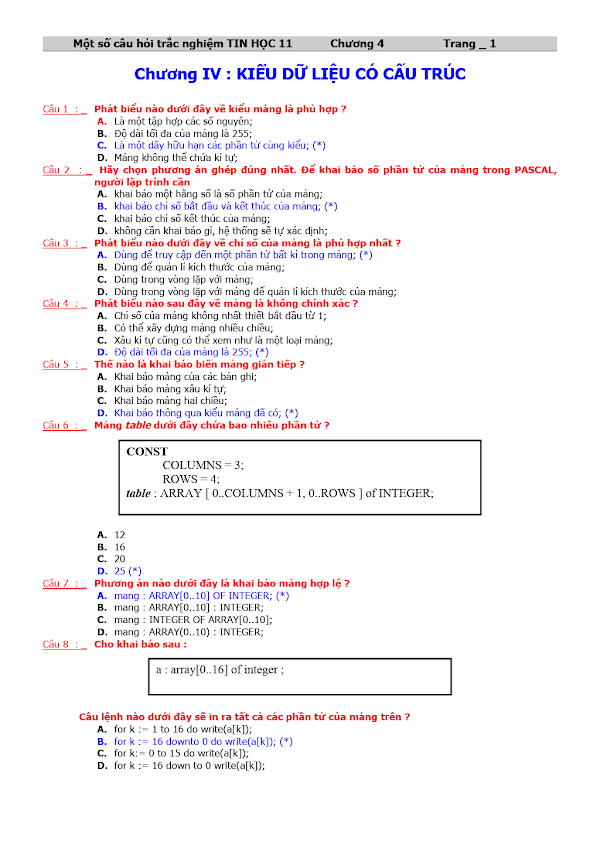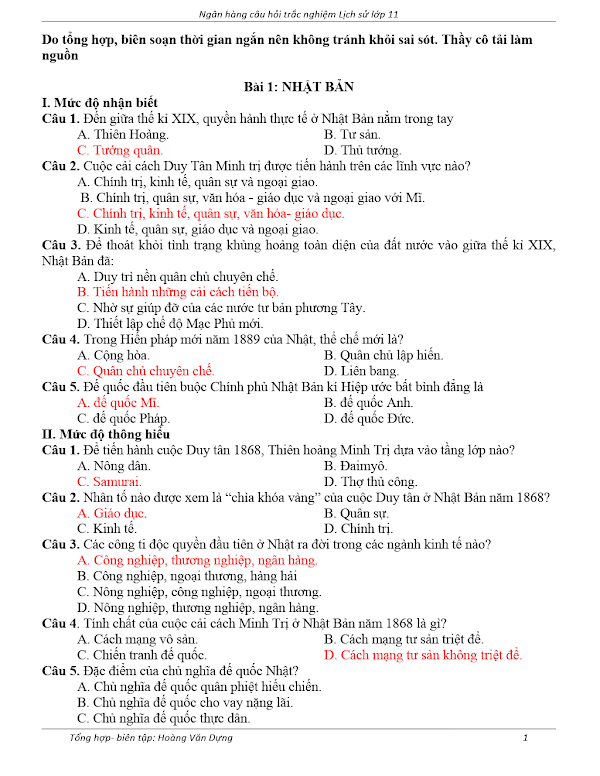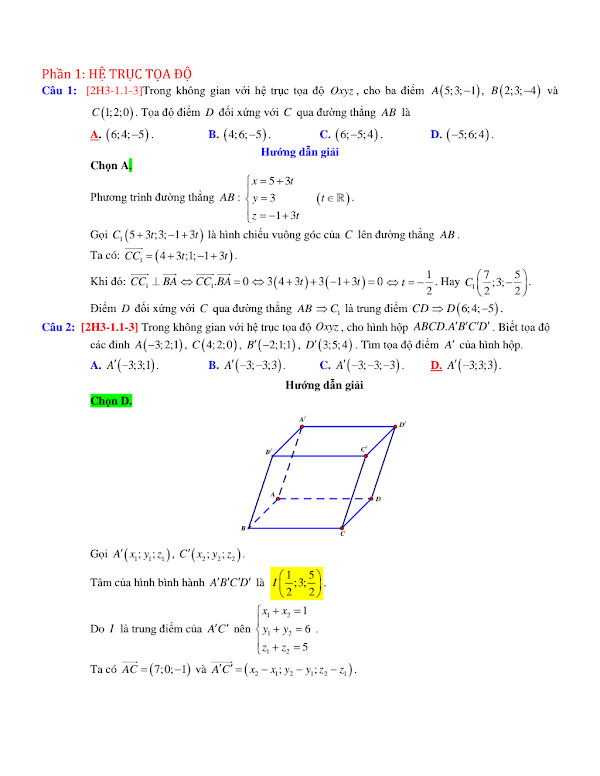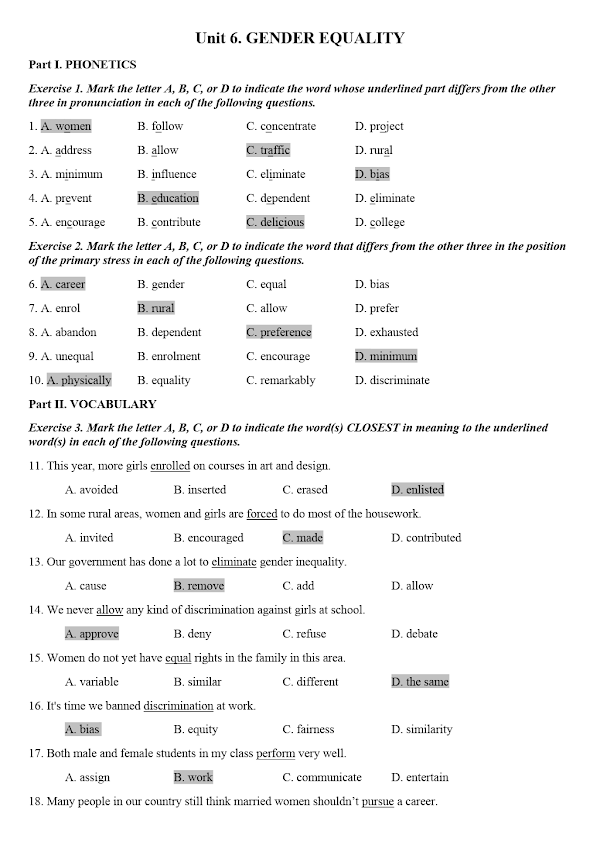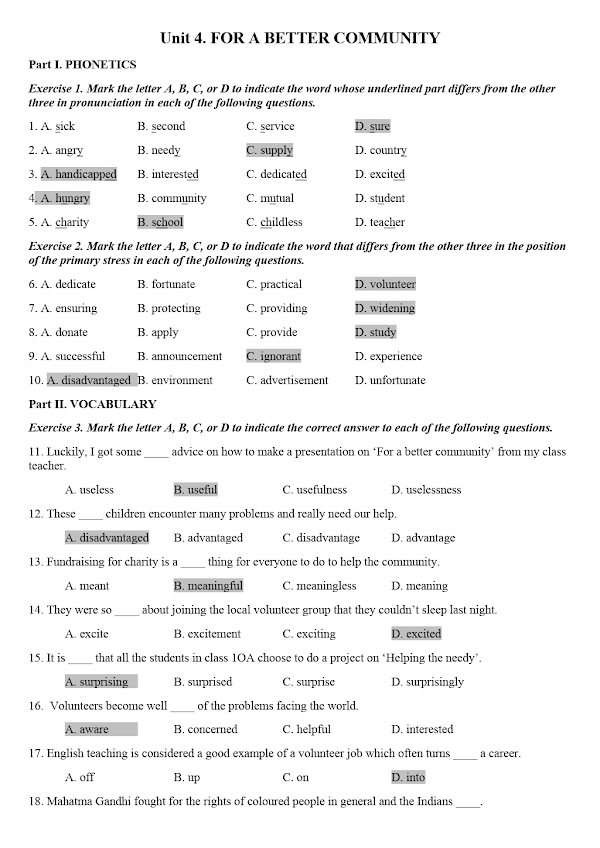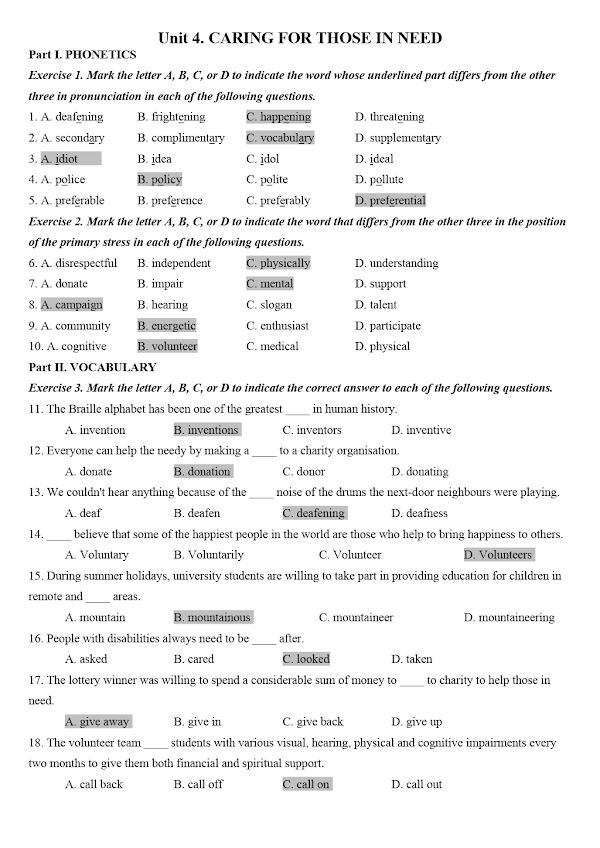Đề kiểm tra môn Tiếng Anh lớp 9
Chào các bạn học sinh và quý thầy cô, hôm nay LogaVN gửi tới bạn đọc tài liệu "Đề kiểm tra môn Tiếng Anh lớp 9". Hi vọng sẽ giúp ích cho các bạn học tập và giảng dạy.
You are going to read an article about life in the countryside. For questions 1- 6, choose the answer (A, B, C or D) which you think fits best according to the text
How I came to envy the country mice!
I have been living in London for more than 60 years, but still, when I'm driving and take some clever back-stree short cut, I catch myself thinking: how extraordinary that it is me doing this! For a moment the town mouse I have become is being seen by the country mouse I used to be. And although, given a new start, I would again become a town mouse, when I visit relations in the country, I envy them.
Recently, I stood beside a freshwater lake in Norfolk, made by diverting a small river, near where my brother lives. As he was identifying some of the birds we could see, in came seven swans. They circled, then the haunting sound of their wing beats gave way to silence as they glided down for splashdown.
It is not a 'picturesque' part of the coast, but it has a definite character of line and light and colour. 'You do live in a lovely place,' I said to my brother, and he answered, 'Yes, I do.' There are probably few days when he does not pause to recognise its loveliness as he works with his boats – he teaches sailing – or goes about his many other occupations.
The lake's creator is a local landowner, continuing a tradition whereby the nature of our countryside has been determined by those who own the land. Formerly, landowners would almost certainly have made such changes for their own benefit, but this time it was done to help preserve the wildlife here, which is available for any visitor to see, providing they do nothing to disturb the birds. It is evidence of change: country life is changing fast.
One of the biggest changes I have witnessed is that second-homers, together with commuters, have come to be accepted as a
You are going to read an article about life in the countryside. For questions 1- 6, choose the answer (A, B, C or D) which you
think fits best according to the text
How I came to envy the country mice!
I have been living in London for more than 60 years, but still, when I'm driving and take some clever back-stree short cut, I
catch myself thinking: how extraordinary that it is me doing this! For a moment the town mouse I have become is being seen
by the country mouse I used to be. And although, given a new start, I would again become a town mouse, when I visit relations
in the country, I envy them.
Recently, I stood beside a freshwater lake in Norfolk, made by diverting a small river, near where my brother lives. As he
was identifying some of the birds we could see, in came seven swans. They circled, then the haunting sound of their wing
beats gave way to silence as they glided down for splashdown.
It is not a 'picturesque' part of the coast, but it has a definite character of line and light and colour. 'You do live in a lovely
place,' I said to my brother, and he answered, 'Yes, I do.' There are probably few days when he does not pause to recognise its
loveliness as he works with his boats – he teaches sailing – or goes about his many other occupations.
The lake's creator is a local landowner, continuing a tradition whereby the nature of our countryside has been determined by
those who own the land. Formerly, landowners would almost certainly have made such changes for their own benefit, but this
time it was done to help preserve the wildlife here, which is available for any visitor to see, providing they do nothing to
disturb the birds. It is evidence of change: country life is changing fast.
One of the biggest changes I have witnessed is that second-homers, together with commuters, have come to be accepted as a
vital part of the country scene. And the men and women who service their cars, dig their gardens, lay their carpets and do all
the other things they need are vital to modern country life. It is quite likely that the children of today's workers may be moving
into the same kind of jobs as the second-homers and the retired. Both the children of a country woman I know are at university,
and she herself, now that they have left home, is working towards a university degree.
Much depends, of course, on the part of the countryside you are living in and on personality - your own and that of your
neighbours. In my brother's Norfolk village, social life seems dizzying to a Londoner. In addition to dropping in on neighbours,
people throw and attend parties far more often than we do. My brother's wife Mary and her friends are always going into
Norwich for a concert or to King's Lynn for an exhibition. The boring country life that people from cities talk about is a thing
of the past - or perhaps it was always mainly in their minds.
This is very unlike living in a London street for 50 years and only knowing the names of four other residents. In these 50
years I have made only one real friend among them. I do enjoy my life, and Mary says that she sometimes envies it (the grass
on the other side of the fence ... ); but whenever I go to Norfolk, I end up feeling that the lives of country mice are more
admirable than my own.
1. It is sometimes a source of surprise to the writer
A. to find herself driving through back streets.
B. that she has been in the city for so long.
C. to realise how much she has got used to living in London.
D. that she lives in the city when she prefers the country.
2. The atmosphere created by the writer when she describes the swans is
A. moving.
B. frightening.
C. deafening.
D. disturbing.
3. What does 'It' in line 14 refer to?
A. the lake
B. the fact that the lake belongs to a landowner here
C. the reason for the landowner's action
D. the fact that wildlife now needs to be preserved
4. What is suggested about outsiders who now live in the country?
A. that country people no longer reject them
B. that they often do work like servicing cars and digging gardens
C. that the men and women who work for them are from the city D. that many of them have been in the countryside for a long time
5. Social life in the country
A. depends completely on where you live.
B. is not as boring as people in cities think it is.
C. is not affected by your neighbours.
D. is always less exciting than life in the city.
6. What do we learn about the writer's attitude to London in the final paragraph?
A. She can't adjust to living in London.
B. She has regretted moving to London.
C. The people in her street are unusually unfriendly.
D. Life there is very different to country life
For questions 1-8, read the text below and decide which answer (A, B, C or D) best fits each gap.
Going on a diet
A calorie is a (0) ________ for measuring the amount of energy food will produce. The average person needs about 1,800
calories per day to stay healthy. Without energy, the heart cannot (1) ________ blood through blood vessels and the organs
cannot function.
You (2) ________ weight because you consume more calories a day than your body requires. The only way to lose weight is
to (3) ________ the number of calories you consume. This is the basic (4) ________ behind most diets.
(5) ________, diets don't work for most people. It's not that they don't lose weight: they do, but when they go off the diet, the
kilos creep back. The (6) ________ to losing weight and maintaining weight loss is a sensible diet and exercise plan. You need
to work out how to eat fewer calories than you (7) ________ consume. You should also exercise daily so you can use up
calories. Burning 250 or 500 calories per day can (8) ________ a big difference.
0 A quantity B piece C unit D part
1 A pump B pull C drag D force
2 A make B increase C gain D put
3 A shrink B take C remove D reduce
4 A way B principle C method D kind
5 A Similarly B Though C Unfortunately D Although
6 A key B secret C way D idea
7 A preferably B actually C consistently D eventually
8 A have B do C make D give
For questions 9-16, read the text below and think of the word which best fits each gap. Use only one word in each gap.
I'm not superstitious, honestly!
How (0) many people could truly say they are not superstitious? A recent survey shows that almost 90% of people
believe in one sort of superstition (9) _____________ another and say that it influences their lives.
One of the questions people (10) _____________ asked is whether they saw themselves as lucky or unlucky. Their answers
turned out to be the most interesting aspect of this survey. Nearly two-thirds (11) _____________ those taking part said they
believed that people were naturally lucky or unlucky.
Professor Morgan Howard, (12) _____________ analysed the results of the survey, was fascinated by this finding, so he went
a step further and asked these people (13) _____________ kind of superstitions they believed in. (14) _____________ his
surprise, he discovered that almost all the people who regarded themselves (15) _____________ lucky believed in positive superstitions. They did things to promote their good luck, such as crossing their fingers. (16) _____________ would appear
that people make their own luck by their attitude to life.
For questions 17-24, read the text below. Use the word given in capitals at the end of some of the lines to form a word that fits
in the gap in the same line.
Wild animals
Wild animals have (0) recently made an appearance in
the back gardens of American suburbs. They have caused
havoc and have (17) __________ domestic pets.
Mountain lions that wander into suburbs are now quite
(18)_________ to attack humans, which is worrying, while
bears and wolves have (19) __________ discovered rubbish
bins. If you find the (20) __________ of your bin scattered all
over the garden one morning, there is a distinct (21)________
that a bear has been feasting there during the night.
Nobody should be particularly surprised by this development,
which was predicted by experts years ago, and it's not (22)
__________ under the circumstances. One cause is the
massive expansion of (23) __________ into areas that were
wild and uninhabited not long ago. In addition, over the past
few decades a large number of (24) __________ have been
placed on hunting certain animals, allowing their populations
to grow. It looks as if humans will simply have to get used to
their new neighbours.
RECENT
THREAT
WILL
APPARENT
CONTAIN
POSSIBLE
EXPECT
HOUSE
RESTRICT
For questions 25-30, complete the second sentence so that it has a similar meaning to the first sentence, using the word given.
Do not change the word given. You must use between two and five words, including the word given.
Eg: I'll be very happy when I go on holiday. FORWARD
I'm looking forward to going on holiday.
25. The phone was cheaper than I expected. AS
- The phone was _________________________________ I expected.
26. Why didn't you tell me I was wrong? TOLD
- You _______________________________________ I was wrong.
27. She found the photographs when she was cleaning her room. CAME
- She ________________________________ when she was cleaning her room.
28. How many portraits did Picasso paint? BY
- How many portraits ____________________________________________ Picasso?
29. 'Please don't stay out late,' his mother said. ASKED
- His mother ____________________________________ out late.
30. I'd rather not go out this afternoon. FEEL
- I ____________________________________ out this afternoon.

